
Tell us what you need to find a matching loft conversion specialist

Get free quotes from professionals near you

Compare offers and choose the one that best matches your need
- Householdquotes.co.uk
- Driveway
- Driveway Materials
- Brick Driveway Guide
Brick Driveway UK: The Complete 2024 Guide

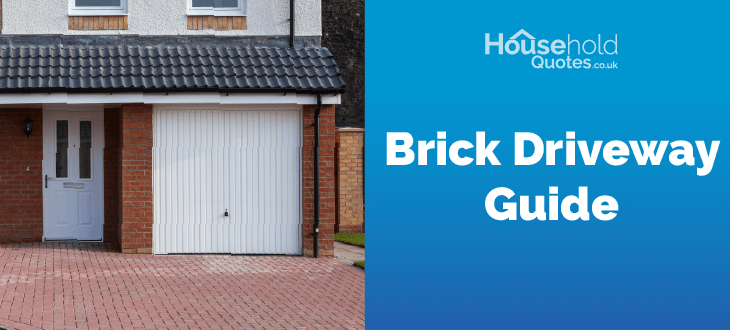
- A brick driveway covering 20m2 for a single car will cost between £4,000 and £5,000.
- Herringbone is the best brick pattern for a driveway as it is durable and can handle heavy traffic.
- It usually takes 4 to 5 days to install a brick driveway on a 40m² driveway.
- Brick driveways are environmentally friendly because the material is naturally sourced, durable, and slip-resistant.
- You can save on labour costs by DIY-ing a brick driveway, but it requires significant time and effort. Improperly installed brick driveways may result in uneven surfaces and drainage issues.
A brick driveway or paving brick exudes timeless charm and durability, enhancing the curb appeal of any home with its classic aesthetic and robust construction.
Brick driveways have been popular since the early 20th century due to their unmatched durability. Offering a wide range of design possibilities, from traditional herringbone patterns to contemporary sleek layouts, they are the preferred choice for homeowners seeking functionality and style.
In this article, we will confidently explore the many benefits of brick driveways, the installation process, maintenance tips, and the various design options available to help you transform your driveway into a stunning, long-lasting property feature.
Ready to elevate your home with a stunning brick driveway? Household Quotes connects you with top driveway specialists in your area, ensuring you get the best deals.
Fill out our 30-second form to receive four free quotes from local driveway installers tailored to your needs and budget.
- Describe your needs
- Get free quotes
- Choose the best offer
It only takes 30 seconds

Best block paving bricks on the market today
In the UK market, the best block brick pavers are renowned for their exceptional quality, durability, and timeless appeal.
Block paving bricks, or brick pavers, differ from other bricks used in landscaping designs such as garden walls or houses.
It's essential to look for brick pavers rather than bricks. Brick pavers are solid and smooth without any holes, contributing to the sturdiness and durability of your driveway.
Clay brick pavers have a limited range of colours, but you can choose from such colours as;
- Reds
- Browns
- Buffs
- Blues
The colours you choose depend on personal preference. However, the best block paving bricks prioritise quality, size, and thickness.
The best block paving bricks are at least 60mm thick; any thinner and the weight of your vehicle may cause the clay bricks to crack. If your new driveway is exposed to heavy traffic, opt for a thickness of around 70mm.
The standard size of a block paving brick is 100-105 x 200-215 x 60mm. However, other types, such as setts, cobblestones, and squares, are available. Setts have a standard size of 300mm x 300mm, cobbles 60mm x 60mm, and squares 150mm x 150mm.
These sizes allow for various design options for your block-paving brick driveway. The size will affect the cost and the number of bricks required, so factor this in when planning.
Which brick weave is the best for your driveway?
A brick weave refers to how you lay out the bricks of your driveway. The best brick weave for your driveway depends on several factors, including aesthetic preference, durability, and ease of installation. There are different types of brick weaves:
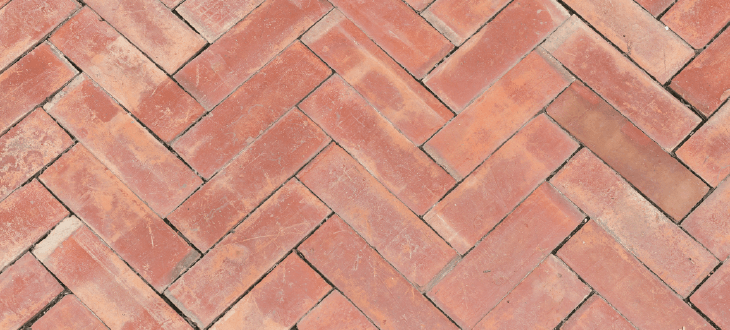
1. Herringbone pattern: This durable weave is excellent for driveways because it provides strong interlocking strength. The bricks are laid at a 45—or 90-degree angle to the borders, creating a zigzag pattern that can withstand heavy traffic and prevent shifting.
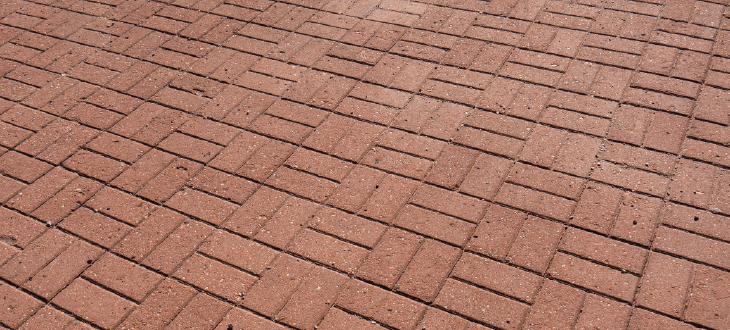
2. Basket weave pattern: This classic design features pairs of bricks laid horizontally and vertically in alternating patterns. It's visually appealing and adds a traditional touch to driveways. However, it may be weaker than the herringbone pattern for withstanding heavy loads.
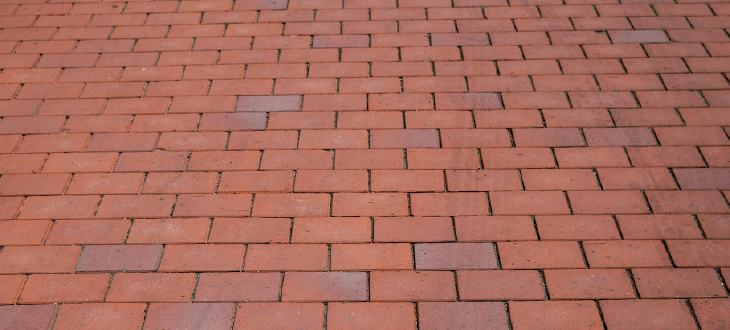
3. Stretcher bond pattern: This pattern involves laying bricks in rows, with each brick offset by half the brick's width in the row above. It's simple to install and creates a clean, linear look, though it might not be as interlock-strong as the herringbone pattern.
The herringbone pattern is often considered the best for most driveways due to its exceptional strength and resistance to shifting under heavy loads. However, the final choice should balance functional needs and personal aesthetic preferences.
How much does brick paving cost?
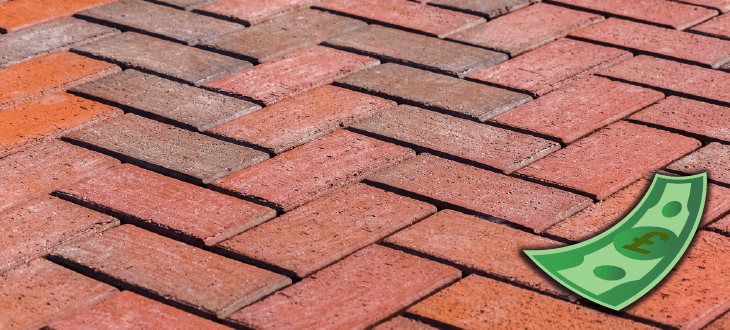
The cost of brick paving in the UK can vary significantly based on factors such as the bricks' quality, the design's complexity, the driveway's size, and your location.
According to BuildIFY Ltd, brick paving costs between £4,000 to £5,000 for a 20m2 driveway. This type of paved driveway is more expensive than concrete pavers, as clay bricks are much harder to cut and heavier, requiring more experienced specialists.
Clay bricks are naturally sourced, unlike concrete or tarmac. This means they are more environmentally friendly, but the extraction costs increase as they are more challenging to obtain than artificial ingredients like concrete.
While clay bricks may have a higher upfront cost, their durability, aesthetic appeal, and environmental benefits can make them a preferred choice.
Brick paving driveway: the cost per m2
Brick paving costs between £60 and £108 per m2. According to PavingExpert, you will typically get around 50 bricks per square meter, but this is dependent on the size of brick you choose.
The cost of clay bricks is influenced by the quality of the brick, the size and shape as well as the accessibility and location of your home.
If your home is located remote, transportation costs for clay materials will increase. To reduce prices, try sourcing your clay bricks locally. Because of the higher cost of living, premier prices of clay bricks are put on homes in and around London.
We have created the table below to show the cost per m2 based on the range for standard driveway sizes. This will give you a better idea of what costs to expect.
| Driveway size | Average cost |
|---|---|
| 2 car driveway (30m2) | £1,200-£1,800 |
| 3 car driveway (40m2) | £3,600- £6,300 |
| 4 car driveway (60m2) | £5,400-£9,450 |
It's important to note that the table above shows only the cost of materials. Other factors will also contribute to the cost of block paving bricks. Labour and groundwork costs significantly affect the overall price of block paving bricks.
How much does installing a brick driveway cost?
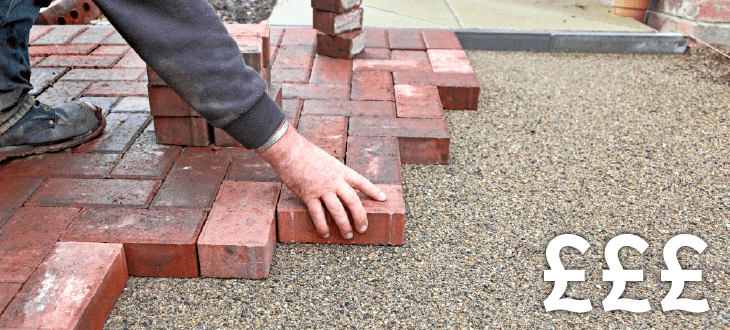
Driveway installers usually charge a daily rate of £150-£200 per person. Around 70% of your expenses will go towards labour when installing a block paving brick driveway.
Driveway landscaping installation will depend on the experience of the driveway specialist and the time it takes to install it, which is influenced by the shape, size, and complexity of the block brick paving design.
When calculating the labour cost of installing brick pavers, it's essential to consider the time it will take. Driveway specialists typically charge a daily rate, so understanding the estimated time for installation is crucial. Below is a table showing the average time required based on the size of the driveway:
| Driveway size per m2 | Timeframe |
|---|---|
| 40m2 | 4-5 days |
| 70m2 | 5-6 days |
| 100m2 | 7-8 days |
Extensive excavation and removing an old damaged driveway will lengthen the completion time for the new driveway and increase labour costs.
Additionally, lowering a kerb outside your home will require planning permission, which will increase the cost of the brick paver and labour.
Any additional features you want to add, such as lighting or gates, will also extend the time needed to finish the brick driveway and increase labour costs.
Are you looking for the best prices on driveway specialists? We can provide you with four free quotes from trusted local driveway installers.
Our quotes are tailored to your specific needs. All you have to do is fill out a quick 30-second form. There are no obligations or contractors involved. Click below to learn more.
- Describe your needs
- Get free quotes
- Choose the best offer
It only takes 30 seconds

Average cost of paving bricks
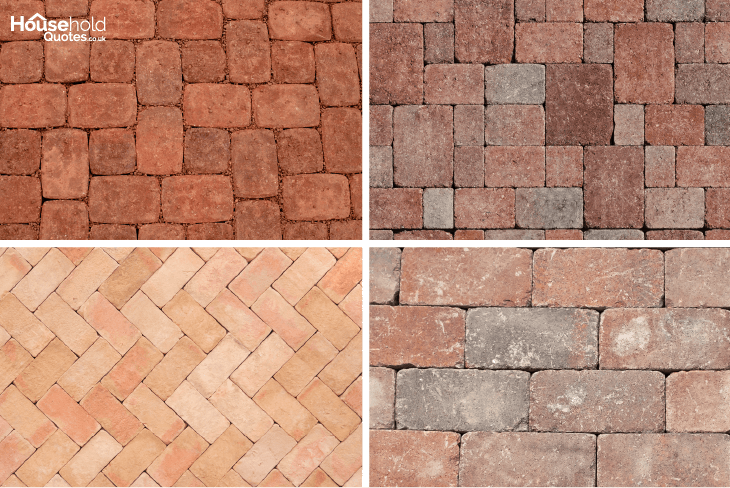
On average, it will take around 1,000 bricks for you to install a driveway of around 20m2. Various suppliers offer a range of brick pavers at different prices depending on the brand, quality, colour, and thickness. Many suppliers offer brick packs and provide the cost per pack as well as the cost per square meter.
We have listed some types of bricks available on supplier sites and their costs per square meter to give you an idea of what is available.
| Brick Type | Cost per m2 |
|---|---|
| Monksbridge Royale Block paving | £42.08 |
| Woburn rumbled Brindle Block paving | £47.62 |
| Driveway Red Block paving | £26.50 |
| Driveway Buff Block paving | £26.50 |
Many suppliers offer bricks in packs. For example, the Monksbridge Royale Block Paving comes in a pack of 360 bricks for a total cost of £404 at B&Q. While the average cost per pack is around £400, it's crucial to note the number of bricks included.
For instance, Woburn Rumbled Brindle Block Paving might initially seem more expensive at £431 per pack. However, each pack contains 672 bricks. For a 20m² driveway, you would likely spend around £862 on Woburn Rumbled Brindle Block Paving, compared to approximately £1,212 for 1,000 Monksbridge brick.
Can you DIY a brick driveway?
Creating a brick driveway on your own is possible. Still, paving stones requires thorough planning, the right tools, and significant physical labour. Below is a step-by-step guide to DIY a brick driveway:
- Design your driveway and measure the area to calculate the number of bricks and materials needed.
- Dig out the area to a minimum depth of 150mm and add a sturdy sub-base using crushed stone and sand to help distribute weight evenly.
- After the subbase is added, insert a weed barrier. This is optional but recommended to decrease the maintenance requirements of block paving bricks.
- Add edge restraints typically made from concrete, metal or plastic. These restraints hold the brick pavers together.
- Add a layer of bedding sand to secure the bricks of the driveway
- Layer the bricks into the driveway. The paving stones should be layered in loosely.
- Fill in the joints of the brick pavers with kiln-dried sand and compact the surface to ensure stability.
While a DIY brick driveway can save on installation costs, it demands significant time and effort, and any mistakes can lead to future issues with uneven surfaces or drainage. Therefore, consulting a professional is advisable.
Brick pavers for driveways: pros and cons
Brick pavers are a popular choice for driveway surfaces, offering both aesthetic and functional benefits but also drawbacks. Here are the pros and cons:
- Durability: Brick pavers are highly durable and can withstand heavy loads and traffic, making them ideal for driveways.
- Aesthetic appeal: They offer a timeless and classic look with rich, natural colours that do not fade quickly, enhancing your home’s curb appeal.
- Environmentally friendly: Made from natural clay, brick pavers are eco-friendly and can be recycled.
- Versatility: Brick pavers come in various shapes, sizes, and colours and can be laid in different patterns, allowing customisation to suit your design preferences.
- Maintenance: Minimal maintenance is required, and damaged pavers can be replaced without disturbing the surrounding area.
- Slip resistance: Brick pavers naturally provide good traction, reducing the risk of slipping, even when wet.
- Cost: Brick pavers tend to be more expensive than other options like concrete in terms of material and installation costs.
- Installation time: Laying brick pavers is labour-intensive and time-consuming, especially if there are intricate patterns.
- Weed growth: If a weed barrier is not installed, , weeds can grow in the joints between pavers, requiring regular maintenance to keep them at bay.
- Shifting and settling: If not correctly installed, brick pavers can shift or settle unevenly, leading to an uneven surface that may need correction.
Brick pavers offer a durable, attractive, and environmentally friendly option for driveways but come with higher costs and potential maintenance challenges. Homeowners should weigh these factors based on their priorities and budget when choosing materials for their driveways.
- Describe your needs
- Get free quotes
- Choose the best offer
It only takes 30 seconds

FAQ
The disadvantages of brick pavers include higher initial cost, longer installation times, the potential for weed growth between joints, and the need for periodic maintenance to prevent shifting or settling.
Bricks are more expensive than pavers like concrete due to the higher material and production costs associated with clay and their premium aesthetic appeal and durability.
Brick pavers are also known as block paving bricks or simply pavers. These terms help distinguish between bricks for driveways and other landscaping projects, such as garden walls.
For 1,000 paving bricks covering an area of 20m2, the average cost is between £800 and £1,000, depending on the brand and quality you choose.

Caoimhe is an experienced content writer and researcher who is passionate about providing accessible information to every reader. With a background in English literature and Sociology, she combines the two disciplines to create cohesive, well-thought-out, and well-informed pieces.
